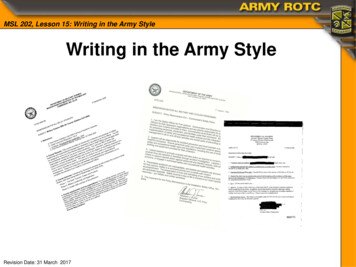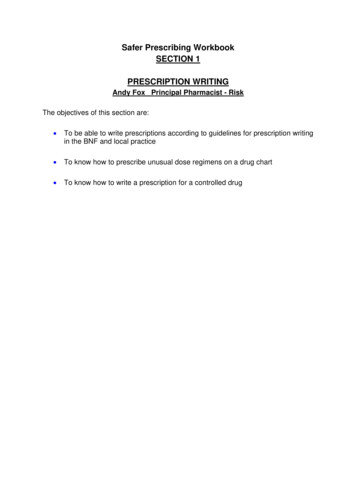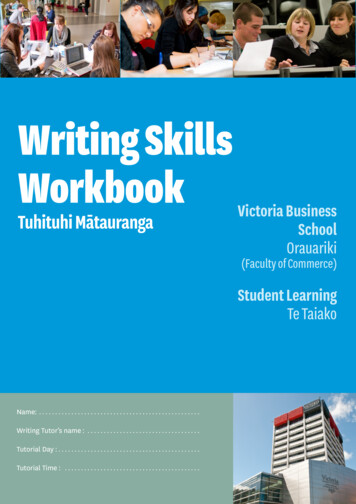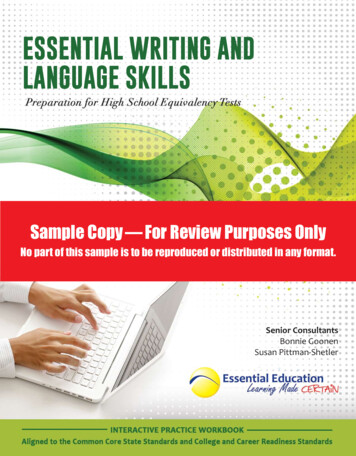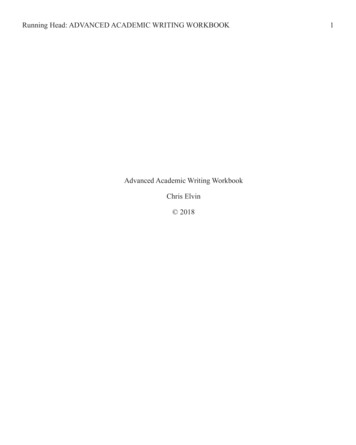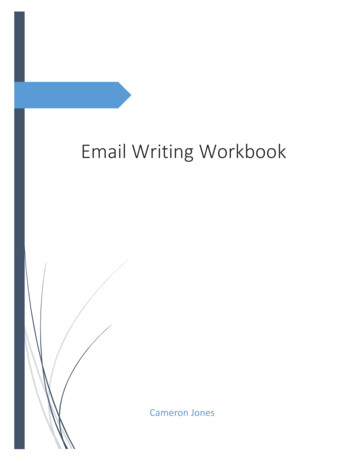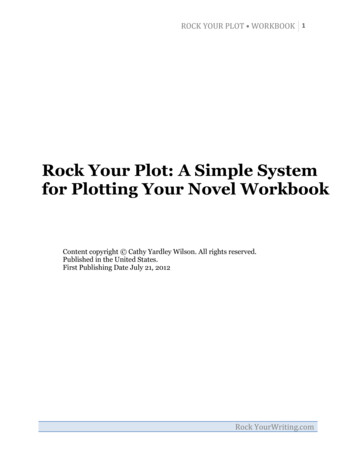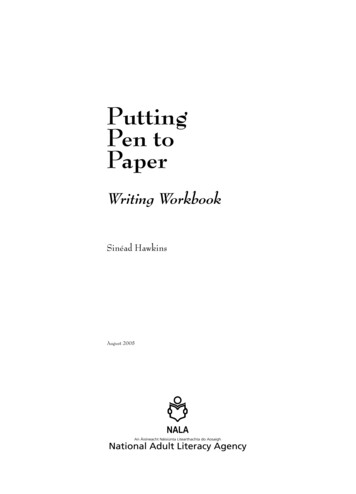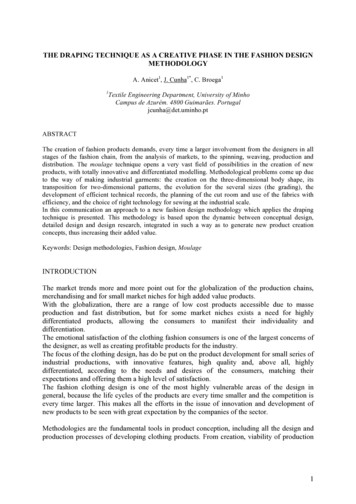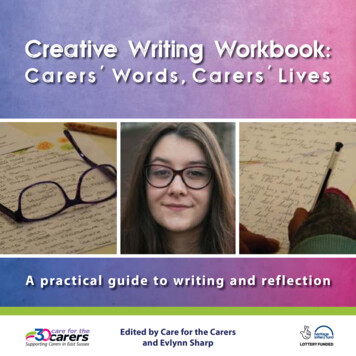
Transcription
Creative Writing Workbook:C a r e r s ’ Wo r d s , C a r e r s ’ L i ve sA practical guide to writing and reflectionEdited by Care for the Carersand Evlynn Sharp
“We need our voices to be heard. In creative writing we findour voices, our innermost feelings, our sacrifices the effectsof being a carer.” Carer, creative writing workshop
Creative Writing Workbook:C a r e r s ’ Wo r d s , C a r e r s ’ L i ve sA practical guide to writing and reflection“Part of me is trying to speak.Part of me is trying to be heard ” Hazel
ACKNOWLEDGEMENTSCare for the Carers gratefully acknowledgesthe financial assistance of Heritage LotteryFund, ExPat, and Eastbourne Council. Thecreative writing project was initially possiblethanks to a gift in a Will. If you would like tolearn more about leaving a gift in your Willthen please get in touch with the charity.First published in Great Britain in 2019 byCare for the Carers Press, Eastbourne, UKTypeset by Woking Print & PublicityDesigner Richard WoodsManaging Editor Jennifer TwistWe thank carers for participating in the writingand heritage projects and for their contributionsto this book, and Evlynn Sharp who has driventhe project empowering carers to expresstheir stories creatively. Thank you to our carervolunteers – Chris, Denise, Donna, Lea andMeena – for developing a special collection of12 short films, and to Eastbourne Heritage, TheMass Observation Archive at The Keep, RoyalAlbert Hall, and Adliberate for providing trainingand advice to our carer volunteers.Copyright 2019 Care for the Carers Pressand the authorsDevelopmental Editors Jo Egan, Amy Hope,Annie MannionEditor Evlynn SharpPhotography Dan and Ren Scott-Bridge;Evlynn Sharp; Unsplashunsplash.com/licenseArtwork Meena Ransom (page 36)Printed and bound by Woking Print & Publicity,The Print Works, St John’s Lye, Woking,Surrey GU21 1RS. 01483 884884Creative Writing Workbook:Carers’ Words, Carers’ LivesAll rights reserved. No part of this publicationmay be reproduced without writtenpermission, except in the case of brief extractsembodied in articles, reviews or lectures.British Library Catalogue in Publication DataA catalogue record for this book is availablefrom the British LibraryISBN 978-0-9955957-1-2Care for the CarersHighlight House, 8 St Leonard’s Road,Eastbourne, East Sussex BN21 3UH01323 738390 www.cftc.org.ukCharity number 1074906Company number 3677361
INTRODUCTION: Why we have created this workbookThis creative writing workbook emerges fromour belief in the importance of hearing carers’voices and sharing their stories.An unpaid carer is someone who looks after afriend, family member or neighbour who due toillness, disability, a mental health problem or anaddiction could not cope without their support.For two years, Care for the Carers has beenprivileged to work with a writer in residence –poet Evlynn Sharp whose creative writingworkshops support carers to reflect on, andshare, their experiences.More than 300 carers have taken part, andmany common themes arise. Some carersexpress their loss of self-identity, loneliness,isolation – and their desire to be heard.I give thanks to the wonderful carers whobravely share their experiences, in both filmand creative writing – their stories continue toinspire and motivate me, every day.A legacy of carers’ voices is so precious, andI am delighted to introduce this workbook –created in 2019 to mark the 30th anniversaryof Care for the Carers. I leave the last words toa carer who has taken part in our project:“Honesty is so important to me, its power hashealed me. Its inspiration has healed others I choose to speak. Because I will no longerbe silenced.” Finn, How Can I Speak?JENNIFER TWISTChief ExecutiveCare for the CarersJanuary 2019We have learnt so much from the writingproject; this workbook is designed to pass onour learning. It can be used individually or tofacilitate groups and workshops, so we can allshare in the power of creative writing.No one left to care alone
CONTENTS4GuidanceHow to use this workbook; how to run a group; accessWorkshop ThemeType of ExerciseDurationIdentityWriting and reflection10-30 minsCommunityWriting and reflection10 minsMasks and mirrorsWriting and reflectionWriting and reflection10-25 mins30 minsTrue namesWriting and reflection25 mins16SolitudeWriting and reflection20-35 mins17Other sideWriting and reflection10-15 mins18-19Pieces of lifeInspiration: writing and reflection10-15 mins20-21MemoryWriting exerciseSenses: writing exercise10-15 mins15-30 mins22-23EmotionSelf-exploration15-30 mins24-25RoleSelf-reflection10-15 mins26-27Situations:waiting and limboWriting and reflectionSelf-reflection40 mins30 mins28-30Contents6-8Page Number9-111213-15No one left to care alone
CONTENTSWorkshop ThemeType of ExerciseDurationExperienceSelf-reflection35 mins31Face: mappingMaking mapsWriting and reflection10 mins20 mins32-33SymbolismWriting20 mins34-35How can I speak?Questions: writing and reflection30 mins36-37PlaceWriting and reflectionPostcard: writing35 mins10 mins38-39Story, objects,daily routine:filmsStory: writing andreflectionObjects: reflectionDaily routine: writing40 mins15 mins15 mins45 mins40-43Purpose: wishand wisdomWriting and reflection35 mins44-45Word of selfRepetition: writing and reflection25 mins46LegacyRemembrance: writingWriting and reflection10 mins25 mins47-48No one left to care alonePage NumberContents5
GUIDANCE: How to use this creative writing workbookThroughout the book, there are examples ofcarers’ writing along with starter lines and ideasfor your own writing and reflection on specificthemes. You can use the exercises in or out ofsequence, and return to do a writing task againas your responses will be different.Suggested length of exercises Using thesuggested timings for your writing such as anexercise of 10 minutes can be helpful to containemotions. It means you know you can write fora short time and end the exercise, shifting yourenergy and mood.The exercises are open to everyone. Dependingon your access needs, you might wantadditional support such as someone who willbe your scribe to note down your ideas andresponses. Only ever attempt an exercise if youfeel safe to do so. Writing can raise issues – ifanything arises you find difficult to deal with,please make sure you seek support.Basic material A ballpoint pen. A supply ofwhite, unlined A4 paper. Without the limitationof lines, the blank page is best to use for creativewriting exercises.GETTING STARTEDHere are the basics to get you started, then justchoose for yourself what exercises in the bookare best for you – there is no right or wrongapproach in creative writing.Basic technique Freewriting is an ideal wayto write about anything. Write down yourthoughts in response to a starter line, or topic,without pausing to think about punctuation,spelling, grammar, or what you are writing.The idea behind freewriting is when you knowthe theme, starter line, and length of exercise,you keep writing without stopping. Even if youthink, ‘I don’t know what to write’ – then writethat down! Let your thoughts travel through thepen, onto the page, and keep your pen movingacross the page so your writing flows. Keep onwriting even if you seem to move off a themeor an idea.6GuidanceWriter’s journal A notebook is helpful forself-reflection and exploration of the writingprocess. Choose a journal that suits yourpurpose – from a small spiral-bound pad to alarge, eco-friendly notebook – to record yourthoughts about the writing process, your ideas,questions, quotes, dreams, writing, creativeexpansions.Where and when Write any time and anywherethat is comfortable for you, in or outside yourhome – at the kitchen table, or in a café, or evenon the bus.HOW TO RUN A GROUPThe key to running workshops is goodwill, goodplanning and preparation, and being mindful ofthe safety and wellbeing of participants.Host Establish that relationship of goodwillbetween yourself and the host charity ororganisation. Thank the staff for their supportand contribution. Everyone can share a sense ofownership of the project. Agree a protocolNo one left to care alone
that includes roles, arrangements, outcomes,deadlines, equality and diversity policy, dataprotection, evaluation, copyright permission.Basics Be sure to have the basics in place: yourDisclosure and Barring Service (DBS) check,public liability insurance, training in groupfacilitation and safeguarding.Facilitation If you have no experience ofrunning groups then attend workshops soyou can watch other people at work. Developthe craft of facilitation and review your ownpractice. Be mindful of human behaviour: ifissues arise, remember it is nothing personal.Preparation – venue Before any course orworkshop, make sure all the arrangements arein place. Do a risk assessment of the venue –check out access, privacy, heating, refreshments,seating arrangements. Check health & safetyprocedures plus arrangements for locking up.Course – promotion Make sure people havebeen informed about the workshop or course.Find out if any participants have specific needsand ensure accessibility.Workshops – content Structure a workshopwith care and attention, decide on themes forthe workshop or course, and use accessibleexercises. Prepare more exercises than you willuse. The role of a group facilitator needs to beoutlined, and how the group will be run.Make clear to participants what you are invitingthem to do such as read out an extract of a poemrelevant to the theme, then read out the text of anexercise so everyone is sure how to start writing.No one left to care aloneAlways give two starter lines so people canmake a choice, or they might use both linesin the writing. If someone is uncertain aboutstarting, outline the exercise again. Explain how,by using freewriting, people can write whateverthey are thinking about, even if their responseseems unrelated to the theme. Make exercisesengaging and accessible.Materials Group facilitators must bring tothe workshop a plentiful supply of pens, whiteA4 paper plus, if required, blank A5 postcards,drawing pencils, soft pastels, art paper.Safe space Create an atmosphere of safetyand trust so participants can feel safe,respected, and well heard. Invite everyone tocontribute one expectation for the group suchas close listening, confidentiality, or time foreach individual to share.Some people might not be able to write, somake sure someone else can be their scribe.Be aware that not everyone may want to sharetheir writing, and this is okay.Start and finish After welcoming people tothe group, you can use a form of check-in that islike a creative writing exercise. The group poemon page 12 is an example of spoken responses.Leave enough time at the end of a group to doa brief check-out, which might be a word or twothat sums up how each person is feeling.Timing Give enough time to participants whowant to share their own writing – or someoneelse can read out their work. If people prefer notto share then just ask for their thoughts on theprocess of writing.Guidance7
If people go over time in reflection, gently remindthem of expectations – and ensure everyone hasequal time for their sharing.Responses Writing goes deep and can beupsetting; an exercise may spark differentemotional responses from sadness to anger,bringing tears or hurt. Inform people thatwhatever comes up in the writing, it is all right.If conflict occurs then name this and addressit. Ensure flexibility in your practice and be astrong holder of the group.Supporting one another Some of the topicsand the writing produced may be challengingfor participants. Ensure the environment issupportive, where people can speak openly,listen and care for each other.ACCESSIf you are preparing a workshop for peoplewith specific access needs such as British SignLanguage (BSL) translation then make sure youarrange for support well in advance. If you planother tasks that relate to the writing exercises,make sure you have access to equipment andtechnology such as the Internet, television, CDplayer, musical instruments.Access needs Always ensure that access needsare addressed prior to the group session. Ifnecessary, the group facilitator can seek trainingin access. If you need an accessible version of anexercise then plan this resource ahead of time.Accessible exercises The exercises in thisworkbook can be adapted for use by peoplewith different needs such as people with visualand hearing impairments, cognitive disabilities,8Guidanceor motor skills issues. If a person with visualimpairment comes to a group, then the facilitatorcan carefully read out the extract of an exercise,make tasks visually descriptive, or downloada digital version of this workbook for use withscreen reading software.If you are facilitating a group of people who mayrespond more to visual stimuli, the suggestedpoems with each exercise could be substituted fora picture-based option. For example, you coulduse an image or a piece of music instead of apoem to explore a theme.People with certain forms of dyslexia, dyspraxia,autism or physical or motor disabilities mightprefer to engage with an exercise throughdrawing pictures, painting or clay modelling.Charades, illustrations, and the board gamePictionary are alternative ways to explore thethemes suggested in this workbook.Subtitled short films on Care for the Carers’ websiteand YouTube channel are suitable to use in creativearts workshops with groups of people or individualswho have a hearing impairment.This workbook is available to access in audio formatvia Care for the Carers’ website: www.cftc.org.ukIf you have access to a local hearing resource centre,someone from there may be able to participate inyour session and provide BSL translation.Care for the Carers provides information on itswebsite about organising accessible eventsand workshops. It can give links to informationabout ensuring accessibility in the design of thematerials tailored to groups with different needs.No one left to care alone
A WOMAN WHO DEFINESHERSELF (extract) – Ro
This creative writing workbook emerges from our belief in the importance of hearing carers’ voices and sharing their stories. An unpaid carer is someone who looks after a friend, family member or neighbour who due to illness, disability, a mental health problem or an addiction could not cope without their support. For two years, Care for the Carers has been privileged to work with a writer .
